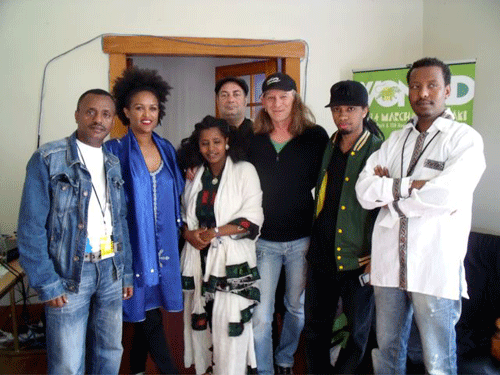R E U P L O A D
Born and raised in Merkato, the largest open market in Africa, where the primary merchandise passing through is locally-grown agricltural products such as Coffee and chat. Merkato also happened to be home to the biggest hustlers in Addis Ababa, the shottest slang and new fashion. Reggae and Hip Hop arrives in Merkato first, then it hits the other parts of the city. When the entire Addis Ababa city goes to sleep, Merkato is always up.
Abdu Kiar grew up listening to music, he fell in love with Roots Reggae, Hip Hop, Tilahun Gessesse and Mahmoud Ahmed. He was always listening and imitating his favorite Reggae's singers and Hip Hop artist such as Biggie Smalls, Mase, and others. He was doing the imitations while adding his own Amharic lyrics to them. He began performing in night clubs around Addis Ababa, audiences loved his style of mixing these different generes of music. He was approached by many producers to record and release an album. However, Abdu Kiar wanted to finish his school and get a degree. He never thought of music as away to make a living, he was doing music for the love of it and he continues to do so to this date. He began attending College and doing music on the side as a hobby. However, the Ethiopian and Eritrean war broke out in 1998. Many Eritreans were deported from Addis Ababa including some of Abdu Kiar's family members. He escaped and went to Saudia Arabia where he became a salesman. It was hard for him, being away from the people he loved and his neighborhood. He was feeling like a motherless child, because Merkato was his home and Ethiopia was the only mother he knew. That war left some scars and deep on wounds on his soul. When the war settled down, he managed to go back home and the first thing he did was write down all his pain and expressed all of his emotions the best way he knew how through music. Accompanied by his producer Dagmawi Ali, he wrote and entire album at one of his favorite stores in Merkato. Twenty days later, the entire album was recorded and released.
Afterward, Abdu Kiar Had to go back to Saudia Arabia and report to his job. The album included the track "Merkato Sefere" meaning merkato my home, dedicated to Merkato, Addis Ababa and Ethiopia. The song opens with a Reggae skank and Abdu begins to sing asking Addis Ababa, "Did stop looking after the ones whom you raised and got lost, did you stop wondering where did they go? Your humble and great children are scattered all over the world suffering, missing you and everything about you, please call them back and and unite them again, when they get together you are their biggest topic and favorite subject. He goes on and says "I don't have any mother beside you, you are my everything, My beloved home, which I don't have any other one". The song became an instant classic and biggest Ethiopian hit of the new century. The most requested song in radios, clubs, and everywhere Ethiopians reside. It became a national anthem, Ethiopians outside of their country related to his words so much. Abdu Kiar himself didn't expect that kind of respond from the song, when the news reached him, he quitted his day job and decided to make music as his full time occupation. He began an extensive world tour for the next three years. Fans declared him the unofficial mayor of Merkato and the proud son of Addis Ababa. He put Merkato on the map and gave it a new face: State of mind. Before the song, Merkato had a negative image and bad reputation. It's a place where find stick-up kids roaming the streets non stop looking for something to rob and hardcore thugs ruled the street. Abdu Kiar showed the softer side of his neighborhood, the caring, sharing and how they take good care of each others; One of them was equal all of them.
Abdu Kiar began working on his second album, writing full time and co/producing it with Dawit Tilahun. Fiker Be Amarigna which means love in Amaharic was one of the top selling albums of 2006. Each song was a huge hit in there, his fan base grew and he came to the USA in 2007. He's constantly pushing the envelope in his music, trying new ideas and playing by his own rules. Ethiopian's live shows in America used to be a singer accompanied by a keyboard player and sometimes a bass player. Live drummers were no longer needed to cut the cost for the promoters and generate huge pay day for the singers. Abdu didn't agree with that, he brought in Tefferi one of the best Ethiopian drummers on the scene, Yohannes Tona "bass", and Behailu Agonafir "keyboard" with him. His message was clear "take the entire band or leave it. That cost him some gigs and beef with promoters, but he stood his ground and said "Music is not about paying my bills and making huge amount of money, it's a message and one must do the best he or she can to delivered it, we need to bring our Ethiopian sound to its highest form".
Abdu Kiar's live shows are considered to be some of the best Ethiopian shows. The energy between him and his band is incredible. "Basically you get your money worth" as one critic noted.
01. Abdu Kiar - Merkato Sefere (5:05)
02. Abdu Kiar - And Alegn (5:19)
03. Abdu Kiar - Min Yilenal (5:44)
04. Abdu Kiar - Zoro Zoro Adam (4:53)
05. Abdu Kiar - Manim Aytamenim (5:08)
06. Abdu Kiar - Deegeet (5:01)
07. Abdu Kiar - Mata Mata (5:25)
08. Abdu Kiar - Lucy (4:09)
09. Abdu Kiar - Alfual (5:28)
10. Abdu Kiar - Yetal Yetal (5:04)
11. Abdu Kiar - Let Teken (4:52)










